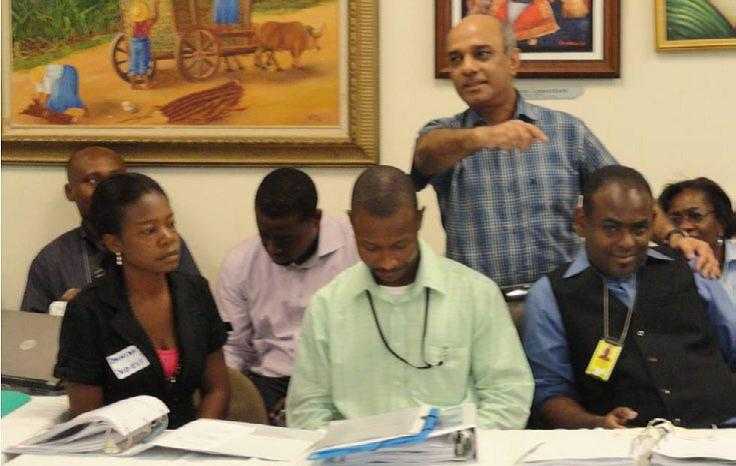Stories From the Field
Training teaches Haitian health care workers: "No one need die from diarrheal disease"

Dr. Azharul Islam Khan, head of the Short Stay Unit, Clinical Sciences Division, Dhaka Hospital, Dhaka, Bangladesh. Khan co-led training of health care workers in Port-au-Prince-au-Prince.
In late October 2010, the public health laboratory of Haiti's Ministry of Public Health and Population (or MSPP) identified the presence of the bacteria that causes cholera in samples from people with acute watery diarrhea in the Artibonite Department. When a cholera outbreak occurs in resource-limited countries like Haiti, where sanitary conditions are poor and safe water systems do not exist, public health officials must act quickly to save lives.
One of MSPP's first requests of CDC and partners was for help to educate health care workers to manage cholera clinically and to teach Haitians how to prevent the illness.
"Education is the key here," says Dr. Robert Tauxe, a CDC expert in waterborne diseases. "Cholera is a fairly simple disease requiring a fairly simple response. But without an understanding of how to mount an effective response, cholera can be quite devastating. It is not only that the general population is unfamiliar with the disease but also that the health care system in Haiti—from staff to facilities—is unprepared to deal with an outbreak. And because cholera can spread fast and kill fast, fluids need to be replaced in the body quickly. If untreated, mortality can reach 20 percent or more. But with treatment, primarily oral or intravenous, mortality can be less than 1 percent."
Three-part approach to training
In November 2010, Tauxe was deployed to Haiti to lead a training campaign for Haitian health care workers. He was joined by Dr. Azharul Islam Khan, head of the Short Stay Unit, Clinical Sciences Division, Dhaka Hospital, Dhaka, Bangladesh, and representative of the respected International Centre for Diarrhoeal Disease Research, Bangladesh, and WHO's Global Outbreak Alert and Response Network. Khan was invited to participate because of his expertise in cholera treatment and management. He arrived at CDC one week prior to deployment to Haiti with Tauxe to assist in the development of the training materials.
Bangladesh is well known for the development of oral rehydration solution (ORS), an intervention credited with saving the lives of more than 20 million children struck with diarrheal diseases. CDC also reached out to Haitian experts, including Dr. Yves Lambert, infectious disease spe¬cialist at Haiti's State University Hospital.
CDC's training complemented the Government of Haiti's public awareness campaigns and messages emphasizing safe water, sanitation, hand-washing and proper food preparation. CDC coordinated message development and clinical guidelines among experts in Atlanta, WHO/PAHO, MSPP, and many partners. Within days, Five Basic Prevention Messages were shared, immediately followed by Diagnosis and Testing guidelines, and Clinical Presentation & Management. Materials were translated into French, Haitian Creole, and Spanish.
The training, which emphasizes that "no one need die from diarrheal disease," is being rolled out in three phases. First, CDC and partners trained 33 "master trainers" selected by MSPP. Topics include:
- The microbe and how it causes cholera
- Clinical presentation and treatment
- Transmission and prevention
- Laboratory diagnosis
- Surveillance
- Clinical management of a single case
- Operation of a Cholera Treatment Center
The master trainers then taught public health officials and clinical staff in Haiti's ten departments.
The final phase involves the training of community health workers (CHW) across the country by department-level health officials. CHWs staff local health institutions that are either part of MSPP's network, or sites funded by the U.S. President's Emergency Plan for AIDS Relief (PEPFAR). Because a large percentage of Haiti's population speaks Haitian Creole rather than French, CHW training materials, including laminated cards, were translated into Haitian Creole. This final stage of training covers a range of instructions, from hand-washing and proper water treatment to effective sanitation and preparation of a body for burial.
Training Expected to Lead to Fewer Deaths
As participants share knowledge gained from the trainings, awareness of how to pre¬vent and treat cholera will increase through¬out Haiti. Similarly, feedback provided by master trainers, department-level health officials, and CHWs is being evaluated by CDC to strengthen the training for the ongo¬ing and future responses. Already, improved understanding of cholera and its treatment is believed to be a factor in the decreasing case fatality rate documented for cholera since the beginning of the outbreak.
According to a partner from the International Rescue Committee who attended training in Port-au-Prince on November 22, "this training has been very useful; the presenters are great and very animated." Of Khan, in particular, she said, "after listening to him, I feel like going out and saving the world."
"Every person at every level has been so cooperative and supportive here," Khan said of his experience at CDC's headquar¬ters and in Haiti. "Particularly useful were the daily calls between the team in Haiti and staff at headquarters." "The two-way discussion has led to a valuable flow of information, which is the grounding for a successful intervention."
"CDC's unique combination of evidence-based approaches, surveillance, clinical training, and applied training in the field should serve as an example for the world."
For the original story and more information, see CDC Global Health E-Brief.
More Information
- Page last reviewed: February 6, 2012
- Page last updated: September 11, 2012
- Content source:


 ShareCompartir
ShareCompartir